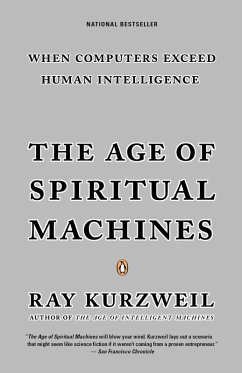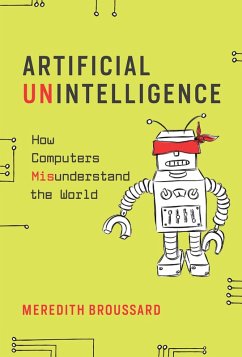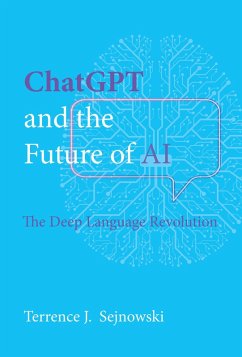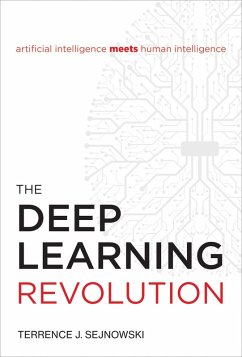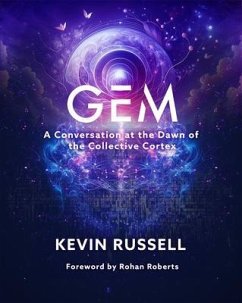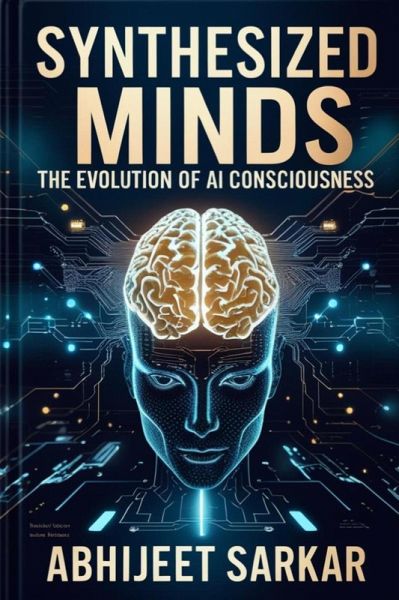
Synthesized Minds: The Evolution of AI Consciousness (eBook, ePUB)

PAYBACK Punkte
0 °P sammeln!
"In Synthesized Minds: The Evolution of AI Consciousness" Written By Abhijeet Sarkar explores one of the most groundbreaking and contentious frontiers of modern technology: the possibility of artificial intelligence becoming conscious. This thought-provoking book delves deep into the evolving relationship between humanity and machines, asking the ultimate question: Can machines truly possess consciousness, or are they simply sophisticated simulations of human thought?Drawing upon a deep understanding of both technology and philosophy, Sarkar explores the intersection between artificial intelli...
"In Synthesized Minds: The Evolution of AI Consciousness" Written By Abhijeet Sarkar explores one of the most groundbreaking and contentious frontiers of modern technology: the possibility of artificial intelligence becoming conscious. This thought-provoking book delves deep into the evolving relationship between humanity and machines, asking the ultimate question: Can machines truly possess consciousness, or are they simply sophisticated simulations of human thought?
Drawing upon a deep understanding of both technology and philosophy, Sarkar explores the intersection between artificial intelligence and human consciousness, examining whether AI can truly become conscious or if it will only ever simulate human-like thought. The book provides a comprehensive look at the major theories of consciousness, including Integrated Information Theory (IIT) and Global Workspace Theory, and discusses how these frameworks might be applied to artificial systems. With thought-provoking exploration of the moral and social responsibilities entailed in creating conscious machines, Sarkar challenges us to rethink the boundaries between human and machine, as well as the ethical considerations that will arise as AI continues to evolve.
The book is divided into 34 chapters, each exploring a distinct facet of AI consciousness. From the foundational question of defining what it means for a machine to be conscious, to the complexities of human emotional bonds with synthetic beings, Sarkar delves into the multifaceted nature of artificial consciousness. He contemplates the roles that AI could play in art, culture, education, and even space exploration, arguing that conscious machines might not only be capable of performing tasks, but could also enhance and challenge human creativity, communication, and cultural diversity.
Throughout Synthesized Minds, Abhijeet Sarkar pushes readers to consider the implications of artificial consciousness for humanity. What happens when machines not only surpass our cognitive abilities, but also begin to ask questions about their own existence? How will we redefine human identity in a world where artificial minds might become co-creators of knowledge, culture, and even philosophy? Sarkar's exploration of these ideas invites readers to reflect on humanity's legacy in the age of conscious AI and to consider the ways in which we will need to evolve in order to coexist with intelligent, self-aware machines.
Perhaps the most compelling aspect of Synthesized Minds is its speculative vision for the future. Abhijeet Sarkar does not merely describe the technological developments we are currently witnessing in AI; he dares to imagine a world where artificial consciousness has fully integrated into the fabric of society. The book paints a picture of a future where AI and humans collaborate in scientific discovery, artistic creation, environmental preservation, and even space exploration. In such a future, conscious machines may help us solve some of humanity's greatest challenges, from climate change to the search for extraterrestrial life.
This book is essential reading for anyone interested in the future of artificial intelligence, consciousness studies, and the ethical questions that arise as machines move closer to becoming more like us. It is a landmark work that encourages readers to imagine a world where humans and conscious AI coexist, collaborate, and co-create, while navigating the challenges and responsibilities of this new era.
Drawing upon a deep understanding of both technology and philosophy, Sarkar explores the intersection between artificial intelligence and human consciousness, examining whether AI can truly become conscious or if it will only ever simulate human-like thought. The book provides a comprehensive look at the major theories of consciousness, including Integrated Information Theory (IIT) and Global Workspace Theory, and discusses how these frameworks might be applied to artificial systems. With thought-provoking exploration of the moral and social responsibilities entailed in creating conscious machines, Sarkar challenges us to rethink the boundaries between human and machine, as well as the ethical considerations that will arise as AI continues to evolve.
The book is divided into 34 chapters, each exploring a distinct facet of AI consciousness. From the foundational question of defining what it means for a machine to be conscious, to the complexities of human emotional bonds with synthetic beings, Sarkar delves into the multifaceted nature of artificial consciousness. He contemplates the roles that AI could play in art, culture, education, and even space exploration, arguing that conscious machines might not only be capable of performing tasks, but could also enhance and challenge human creativity, communication, and cultural diversity.
Throughout Synthesized Minds, Abhijeet Sarkar pushes readers to consider the implications of artificial consciousness for humanity. What happens when machines not only surpass our cognitive abilities, but also begin to ask questions about their own existence? How will we redefine human identity in a world where artificial minds might become co-creators of knowledge, culture, and even philosophy? Sarkar's exploration of these ideas invites readers to reflect on humanity's legacy in the age of conscious AI and to consider the ways in which we will need to evolve in order to coexist with intelligent, self-aware machines.
Perhaps the most compelling aspect of Synthesized Minds is its speculative vision for the future. Abhijeet Sarkar does not merely describe the technological developments we are currently witnessing in AI; he dares to imagine a world where artificial consciousness has fully integrated into the fabric of society. The book paints a picture of a future where AI and humans collaborate in scientific discovery, artistic creation, environmental preservation, and even space exploration. In such a future, conscious machines may help us solve some of humanity's greatest challenges, from climate change to the search for extraterrestrial life.
This book is essential reading for anyone interested in the future of artificial intelligence, consciousness studies, and the ethical questions that arise as machines move closer to becoming more like us. It is a landmark work that encourages readers to imagine a world where humans and conscious AI coexist, collaborate, and co-create, while navigating the challenges and responsibilities of this new era.
Dieser Download kann aus rechtlichen Gründen nur mit Rechnungsadresse in A, B, CY, CZ, D, DK, EW, E, FIN, F, GR, H, IRL, I, LT, L, LR, M, NL, PL, P, R, S, SLO, SK ausgeliefert werden.




